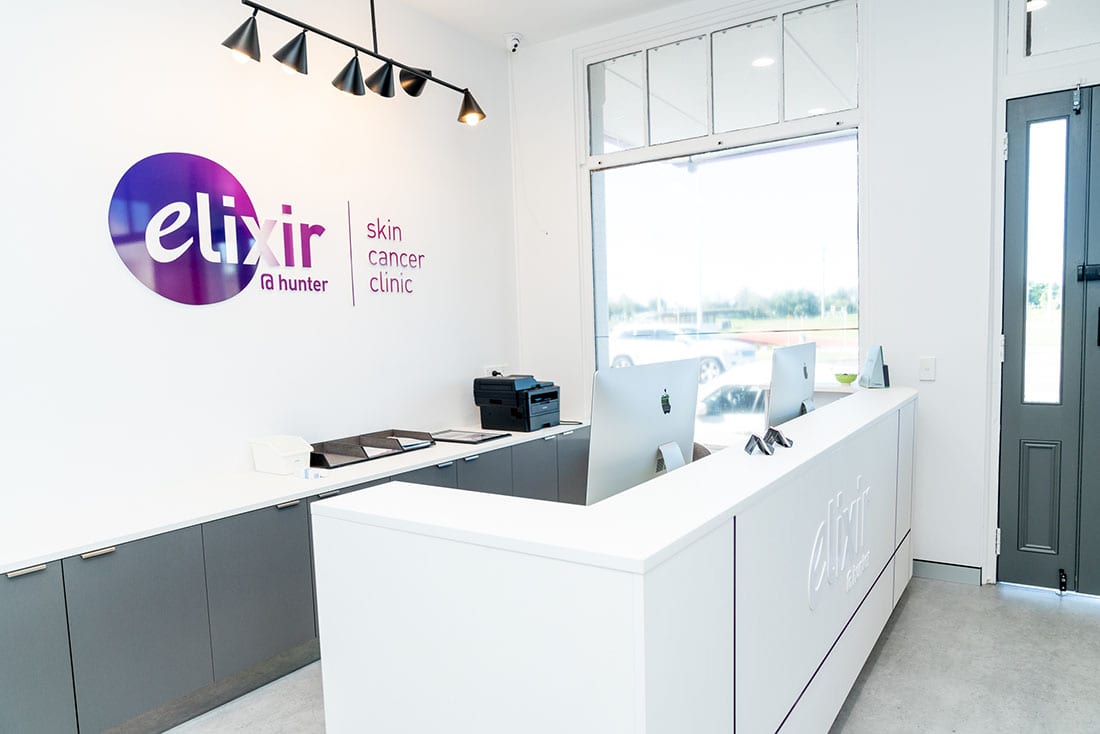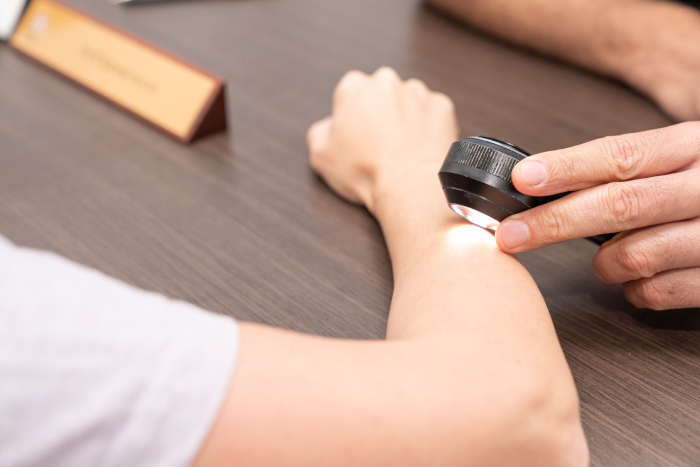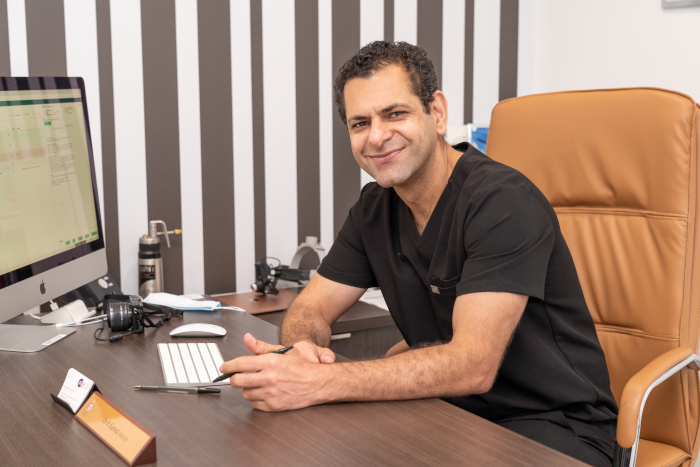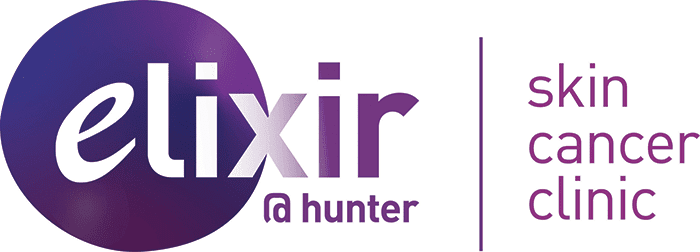
Skin Cancer & Cosmetic Skin Clinic, Maitland Hunter Valley
Elixir @ Hunter is Maitland’s premier skin cancer and cosmetic skin clinic. We provide full skin cancer checks using the latest mole screening technology to accurately scan and diagnose skin cancers, spots and lesions. As a complete care practice, we treat, monitor and follow up with all our patients.

Skin Cancer Clinic Maitland
Open Monday – Thursday
No referral is required although if you have a referral from your GP please bring it along with you to your appointment.
We are located in the heart of Maitland, and provide skin cancer services to the local community of Maitland, and to the surrounding areas of Newcastle, Lake Macquarie, Hunter Valley, Cessnock, Port Stephens, Raymond Terrace, Dungog, Kurri Kurri, Greta, Paterson, Singleton, Branxton, Stroud, Muswelbrook and Central Coast. Visit our skin cancer clinic Newcastle page to learn more about getting the treatment done at our Maitland clinic.
Our Skin Treatments & Services
Elixir @ Hunter provides the local community with professional and good quality skin cancer checks and cosmetic solutions.
Cosmetic
Treatments
CLINIC HOURS
ASSOCIATIONS WE’RE PART OF









Skin Cancer Check Maitland
Elixir @ Hunter Skin cancer clinic is a purpose-built skin cancer and cosmetic clinic, with two operating rooms, a dressing room and a modern laser and cosmetic room. We have parking available for patients at the rear of the clinic, and there is plenty of street side parking in the area and in the sports oval directly across the road from our clinic.
Our Hunter Valley skin cancer clinic is open from Monday to Friday.
Lean more about our team.
The doctors at our clinic are GPs with special interest in Skin cancer management, Cosmetic dermatology and General dermatology. They are passionate about early diagnosis and management of skin cancer, and about anti-aging medicine to keep the skin looking young and healthy. Book an appointment today if you are looking for cosmetic injectables Maitland.
Book a consultation with the doctors at our skin cancer clinic in Maitland today.
Skin Check Maitland
The skin cancer services provided at our clinic are:
Full body skin checkups and spot or mole checkups for melanoma and other types of skin cancers like Squamous cell carcinoma, Basal cell carcinoma, Keratoacanthoma. Our doctors will take a full history and listen to any specific concerns that you have. You will then be thoroughly examined for any skin cancers and the doctor will discuss the findings with you. The doctors will discuss the management plan with you and you will have the opportunity to ask any questions you may have regarding the management plan. The doctors will also advise how often you will need regular skin checkup in future depending on the history and examination findings. Book your consultation with our skin checks Maitland clinic.
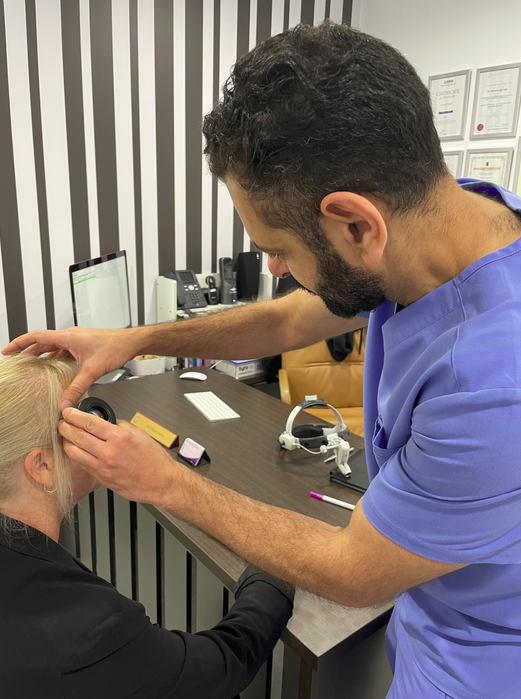
Biopsies and excisions to diagnose skin cancers. Most skin cancers can be diagnosed based on clinical and dermoscopic examination of lesions. Biopsies are sometimes required to confirm the presence of skin cancers. A small skin biopsy is sometimes required to confirm non-melanoma skin cancers whereas larger excision biopsies are usually required to confirm melanoma skin cancers.
Digital monitoring of suspicious skin lesions. Some skin lesions with low suspicion can be monitored digitally. We will take the photographs of low suspicious lesions and save them in the respective patient’s files, and they can be followed up every few weeks or months as needed to see the progression. We use dermatoscope and dermasensor to diagnose and classify the lesion as a high risk or low risk lesion, and plan their management accordingly. A dermasensor is a hand held device and it enables early detection of high risk lesions through non invasive optical spectroscopy. A dermatoscope magnifies the lesion by 10 times and can be used in a polarised mode or non polarised mode to diagnose the lesion. The camera can be attached to the dermatoscope to take magnified images which can be monitored digitally over a period of time.
Definite treatment of melanoma and non melanoma skin cancers. A range of surgical and non surgical treatment options are available for skin cancers depending on the diagnosis. Most of the skin cancers can be successfully treated at our clinic without the need for referral to another specialist centre. We can do all forms of skin cancer surgery which is possible under local anaesthesia including skin grafts and skin flaps repairs. In case the skin cancer management plan is complicated and needs further management at the hospital, we will be able to refer the patients to the local Melanoma Centre or any of the local plastic surgeons.
Definite treatment of precancerous skin lesions using appropriate treatment methods. The pre-cancerous lesions can be treated with the use of topical creams or with minor surgical procedures or with ablative laser depending on the type, size, depth and location of these lesions.
Skin cancer education. We are happy to discuss any questions you may have regarding skin cancer during your consultation. We have education materials published by the Melanoma Institute Australia for you to take home with you after your treatment. Learn more about how to detect early signs of skin cancer.
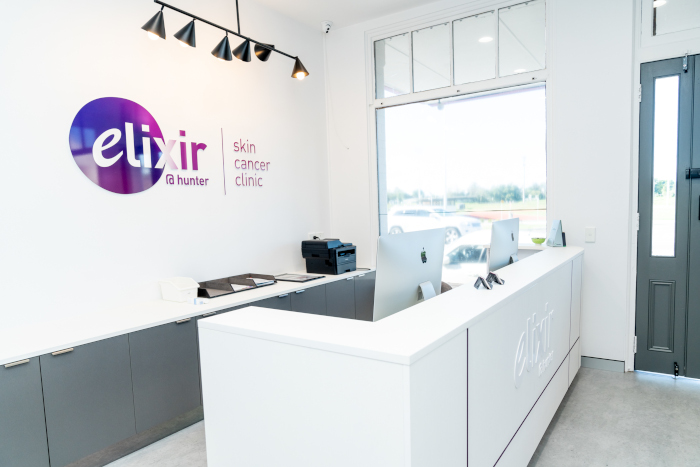
Mole check Maitland
If you are looking for a mole check clinic in Maitland, then call Elixir @ Hunter Skin Cancer Clinic.
Elixir @ Hunter Skin Cancer Clinic provides Melanoma checks in Maitland for patients in the local area and also surrounding areas like Newcastle.
The doctors at Elixir Hunter SkinCancer Clinic are GPs with an interest in skin cancer and they have completed their extra training and qualification in Skin cancer diagnosis and management. The doctors at Elixir Hunter SkinCancer Clinic have been working in the Skin cancer field since 2012, and have more than 10 years of experience in skin cancer medicine and surgery.
The doctors at Elixir @ Hunter are skilled in skin cancer and mole check ups to pick up abnormal moles and melanoma. Our doctors are also highly trained in surgical management of all types of moles and skin cancers. Book your consultation with Elixir @ Hunter doctors to have a comprehensive skin cancer and mole checkup.
During a mole check, one of our doctors will inspect the skin for any suspicious moles, which could be indicative of skin cancer. We use modern technologies to assess and treat moles. Early detection is the key to effective treatment of skin cancer, and a mole check is a simple and non-invasive way to detect any changes in the skin. The process is quick and painless and can help detect skin cancer in its early stages, when it is most treatable.
The first sign of a melanoma is often the appearance of a new spot, or a change in an existing freckle or mole. The change is normally noticed over several weeks or months.
It is important to get a professional skin check by a doctor if anything suspicious appears on your skin or if you are at high risk. Doctors use a number of tools and techniques to examine skin thoroughly, beyond what the naked eye can see. These include dermoscopy using a dermatoscope, digital monitoring and total body photography. These tools help reduce unnecessary biopsies and detect melanomas at an early stage, which can lead to a better outcome.
Dermoscopy is the science of checking the skin using a handheld microscope called a dermatoscope which allows the doctor to see under the surface of the skin using light and magnification. This helps them identify features that are not visible to the naked eye.
Regular skin checks are recommended for certain high-risk people, including those with a history of melanoma in the past, or patients with lots of moles, or strong family history of skin cancers, or with previous history of other skin cancers BCCs and SCCs. The frequency of skin checks is individual, depending on your risk factors and response to treatments.
Digital dermoscopic monitoring can help doctors spot even the smallest changes in a skin lesion over time. High resolution dermoscopy photos of the same lesion are repeated over time (often 3 months for moles; sometimes 6-12 months for other lesions). They are then compared side-by-side to detect any subtle changes and to help the doctor decide whether or not the lesion should be removed.
It is recommended that individuals have their moles checked every 12 to 18 months, especially those who have a family history of skin cancer or have a history of excessive sun exposure. Also, it is highly recommended for the elderly population to get their skin checked regularly, usually every 6-12 months.
Melanoma check Maitland
Australia has the highest rate of melanoma in the world with more than 15,000 new cases of invasive melanoma diagnosed every year. Melanoma is the third most common cancer affecting men and women in Australia.
Melanoma is a dangerous cancer and has touched many families in one way or another. It’s estimated that almost twice as many men than women will die from melanoma.
Melanoma is rarer than other types of skin cancers (SCC and BCC), but it is the most serious form of skin cancer and can grow very quickly if left untreated. It can spread to the lower part of your skin (dermis), enter the lymphatic system or bloodstream and then spread to other parts of the body e.g. lungs, liver, brain or bone. Fortunately, in most cases, melanoma is detected early and does not spread to other parts of the body. Early diagnosis is associated with better outcomes.
Melanoma is a form of cancer that develops in the body’s pigment cells, known as melanocytes. Melanocytes produce melanin to help protect the skin from ultraviolet (UV) radiation (i.e. sunlight). When these cells cluster together in the skin during childhood or adolescence they form a mole. Melanoma occurs when abnormal melanocytes grow in an uncontrolled way and evade the immune system. About a third of all melanomas arise from existing moles but they can develop anywhere on the skin.
The most common site of melanoma in men is the back, and for women is on the legs. Early detection is vital as melanomas that are detected and treated early are cured in 90% of cases.
It is important to check and know your own skin, and seek medical advice if you notice anything new or changing on your skin. The first sign of a melanoma is often the appearance of a new spot, or a change in an existing freckle or mole. The change is normally noticed over several weeks or months.
It is important to get a professional skin check by a doctor if anything suspicious appears on your skin or if you are at high risk. Doctors use a number of tools and techniques to examine skin thoroughly, beyond what the naked eye can see. These include dermoscopy using a dermatoscope, digital monitoring and total body photography. These tools help reduce unnecessary biopsies and detect melanomas at an early stage, which can lead to a better outcome.
Dermoscopy is the science of checking the skin using a handheld microscope called a dermatoscope which allows the doctor to see under the surface of the skin using light and magnification. This helps them identify features that are not visible to the naked eye.
Regular skin checks are recommended for certain high-risk people, including those with a history of melanoma in the past, or patients with lots of moles, or strong family history of skin cancers, or with previous history of other skin cancers BCCs and SCCs. The frequency of skin checks is individual, depending on your risk factors and response to treatments.
Digital dermoscopic monitoring can help doctors spot even the smallest changes in a skin lesion over time. High resolution dermoscopy photos of the same lesion are repeated over time (often 3 months for moles; sometimes 6-12 months for other lesions). They are then compared side-by-side to detect any subtle changes and to help the doctor decide whether or not the lesion should be removed.
Elixir @ Hunter Skin Cancer Clinic provides Melanoma checks in Maitland for patients in the local area and also surrounding areas like Newcastle. The doctors at Elixir Hunter SkinCancer Clinic are GPs with an interest in skin cancer and they have completed their extra training and qualification in Skin cancer diagnosis and management. The doctors at Elixir Hunter SkinCancer Clinic have been working in the Skin cancer field since 2012, and have more than 10 years of experience in skin cancer medicine and surgery.
Book your consultation with Elixir @ Hunter doctors to have a comprehensive skin cancer and melanoma checkup.
